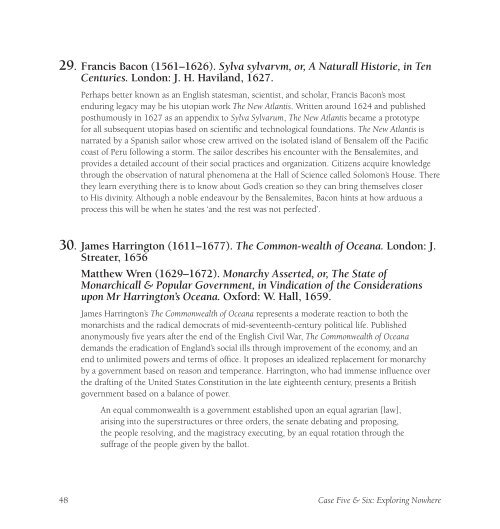From Nowhere: Utopian and Dystopian Visions of our - Chris J. Young
From Nowhere: Utopian and Dystopian Visions of our - Chris J. Young
From Nowhere: Utopian and Dystopian Visions of our - Chris J. Young
You also want an ePaper? Increase the reach of your titles
YUMPU automatically turns print PDFs into web optimized ePapers that Google loves.
29. Francis Bacon (1561–1626). Sylva sylvarvm, or, A Naturall Historie, in Ten<br />
Centuries. London: J. H. Havil<strong>and</strong>, 1627.<br />
Perhaps better known as an English statesman, scientist, <strong>and</strong> scholar, Francis Bacon’s most<br />
enduring legacy may be his utopian work The New Atlantis. Written around 1624 <strong>and</strong> published<br />
posthumously in 1627 as an appendix to Sylva Sylvarum, The New Atlantis became a prototype<br />
for all subsequent utopias based on scientific <strong>and</strong> technological foundations. The New Atlantis is<br />
narrated by a Spanish sailor whose crew arrived on the isolated isl<strong>and</strong> <strong>of</strong> Bensalem <strong>of</strong>f the Pacific<br />
coast <strong>of</strong> Peru following a storm. The sailor describes his encounter with the Bensalemites, <strong>and</strong><br />
provides a detailed account <strong>of</strong> their social practices <strong>and</strong> organization. Citizens acquire knowledge<br />
through the observation <strong>of</strong> natural phenomena at the Hall <strong>of</strong> Science called Solomon’s House. There<br />
they learn everything there is to know about God’s creation so they can bring themselves closer<br />
to His divinity. Although a noble endeav<strong>our</strong> by the Bensalemites, Bacon hints at how arduous a<br />
process this will be when he states ‘<strong>and</strong> the rest was not perfected’.<br />
30. James Harrington (1611–1677). The Common-wealth <strong>of</strong> Oceana. London: J.<br />
Streater, 1656<br />
Matthew Wren (1629–1672). Monarchy Asserted, or, The State <strong>of</strong><br />
Monarchicall & Popular Government, in Vindication <strong>of</strong> the Considerations<br />
upon Mr Harrington’s Oceana. Oxford: W. Hall, 1659.<br />
James Harrington’s The Commonwealth <strong>of</strong> Oceana represents a moderate reaction to both the<br />
monarchists <strong>and</strong> the radical democrats <strong>of</strong> mid-seventeenth-century political life. Published<br />
anonymously five years after the end <strong>of</strong> the English Civil War, The Commonwealth <strong>of</strong> Oceana<br />
dem<strong>and</strong>s the eradication <strong>of</strong> Engl<strong>and</strong>’s social ills through improvement <strong>of</strong> the economy, <strong>and</strong> an<br />
end to unlimited powers <strong>and</strong> terms <strong>of</strong> <strong>of</strong>fice. it proposes an idealized replacement for monarchy<br />
by a government based on reason <strong>and</strong> temperance. Harrington, who had immense influence over<br />
the drafting <strong>of</strong> the United States Constitution in the late eighteenth century, presents a British<br />
government based on a balance <strong>of</strong> power.<br />
An equal commonwealth is a government established upon an equal agrarian [law],<br />
arising into the superstructures or three orders, the senate debating <strong>and</strong> proposing,<br />
the people resolving, <strong>and</strong> the magistracy executing, by an equal rotation through the<br />
suffrage <strong>of</strong> the people given by the ballot.<br />
48 Case Five & Six: Exploring <strong>Nowhere</strong>


